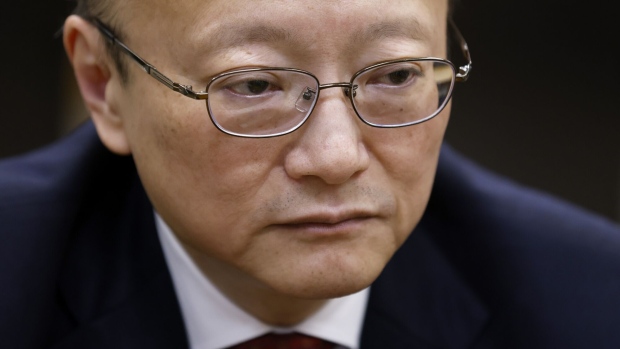(Bloomberg) — The Group of Seven nations renewed commitments on foreign exchange policy that refer to the potentially harmful effects of excessive market movements, pledges that offer member states including Japan some latitude to defend their currencies in the face of dollar strength.
A G-7 statement released Wednesday in Washington that also condemned Iran’s attack on Israel and Russia’s ongoing war against Ukraine contained a line reaffirming the members’ currency commitments outlined in May 2017.
While the reconfirmation of the members’ existing stance on currencies was a small addition in a long statement, Japan’s top currency official Masato Kanda flagged its significance. The statement comes amid growing concern in Tokyo over ongoing weakness in the yen.
“Reflecting Japan’s stance, the G-7 has reaffirmed its commitments to past G-7 policy responses, including exchange rates,” said Kanda, speaking to reporters in Washington. “The key commitment is the recognition that excessive volatility and disorderly movements in exchange rates can have adverse implications for economic and financial stability.”
The yen briefly strengthened to 153.96 against the dollar after Kanda’s comments, before giving up gains to trade around 154.30 around 2 p.m. in Tokyo.
The reference to the adverse effects of excessive movements essentially leaves the door open to members to step into markets under certain circumstances. Japanese officials will likely see its inclusion in the statement as another success this week as they liaise with allies amid speculation that Tokyo may step into the market to prop up the yen.
Read more: Yellen’s Nod to Japan, Korea Adds Scope for Defending Yen, Won
The G-7 reaffirmation followed a joint statement earlier in the day in which US Treasury Secretary Janet Yellen took note of her Japanese and South Korean counterparts’ concern over sharp declines in their currencies.
The acknowledgement by G-7 nations that excessive currency moves harm economies gives tacit permission for Japan to intervene to reduce volatility, according to David Forrester, a Singapore based senior FX strategist at Credit Agricole CIB.
“Accordingly, USD/JPY has retreated from its approach to 155, which is viewed by the markets as the next line in the sand after the breaking of 152,” he said referring to the dollar-yen exchange rate. “Any intervention, verbal or actual, only buys time for the JPY and until the fundamentals can shift in its favor.”
The yen has remained under pressure as market participants now see the US-Japan interest rate gap staying wider for longer than previously. The resilient US economy has pushed back prospects of rate cuts by the Federal Reserve, while the Bank of Japan has signaled it won’t raise rates quickly.
Authorities in Tokyo spent about $60 billion in 2022 to prop up the yen on three occasions, each time insisting that they were not protecting any specific currency level.
The G-7 statement reiterated “unequivocal condemnation” of the attack against Israel by Iran while expressing concern over the crisis in Gaza and calling for continued work toward a sustainable ceasefire.
“We will ensure close coordination of any future measure to diminish Iran’s ability to acquire, produce, or transfer weapons to support its destabilizing regional activities,” the statement said.
–With assistance from James Mayger.
(Adds more details from G-7 statement)
©2024 Bloomberg L.P.
















